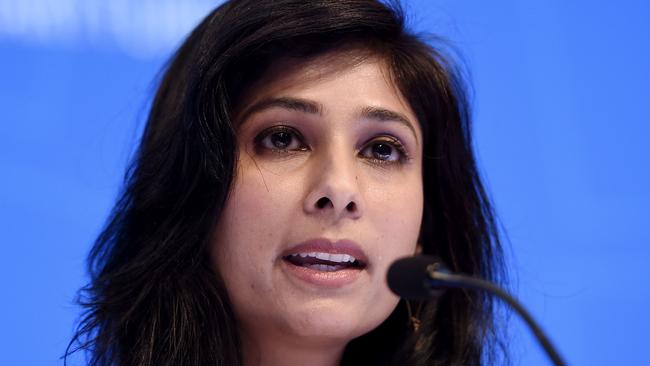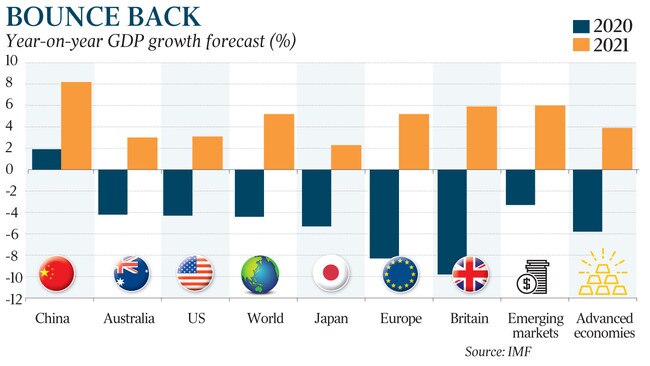Budget 2020: IMF shoots down recovery forecasts
The IMF’s forecast for 3pc GDP growth in Australia next year falls far short of the 4.25pc rebound envisaged by Treasury in last week’s budget.

The International Monetary Fund has revised down Australia’s growth in 2021 from 4 per cent to 3 per cent in its latest World Economic Outlook, providing a more pessimistic assessment than the Morrison government, which is counting on a 4.25 per cent boost to the economy next year.
The updated forecasts came as the IMF warned of a “long, uneven and uncertain ascent” out of the global COVID-19 recession, a “calamity” which it says will blow a $US28 trillion ($39 trillion) hole in the world economy by the middle of the decade and plunge more than 90 million people into extreme poverty.
The new update was seized on by Labor over its call for wage subsidies, enhanced unemployment benefits and credit guarantees for small and medium businesses to be wound back only after economic activity had picked up, with the IMF warning that “premature scaling back of such lifelines … risks pushing the economy back into recession”.
The IMF forecast that Australia would also lag the economic recovery next year among advanced economies, which are expected as a group to rebound by 3.9 per cent in 2021.
Australia’s more sedate pace of growth next year, however, is partly explained by a shallower downturn this year. The IMF predicted national output would shrink by 4.2 per cent this year — an improvement on its -4.5 per cent forecast in June — while other advanced nations would suffer a more severe contraction in 2020 of -5.8 per cent.
Josh Frydenberg said there was “still a long way to go in recovering from this health and economic crisis”. But he argued the economy was “fighting back”, and said the government would “continue to do all that is necessary to create jobs and drive Australia’s economic recovery”.
Opposition Treasury spokesman Jim Chalmers said the IMF report had sounded the alarm “against the premature withdrawal of economic support”.
“Australians can’t afford a slow, jobless recovery caused by a government too eager to rip money out of the economy before the recovery takes hold,” he said.
The IMF’s forecasts were finalised before the release of last Tuesday’s federal budget, which included an additional $110bn in spending measures from the July fiscal update.
The latest quarterly outlook from the world body attempted, for the first time, to gauge the medium-term damage to economies and prosperity as a result of the worst global downturn since the 1930s depression.
“This crisis will likely leave scars well into the medium term as labour markets take time to heal, investment is held back by uncertainty and balance sheet problems, and lost schooling impairs human capital,” IMF chief economist Gita Gopinath said.

The cumulative loss in global output as a result of the health crisis, versus the IMF pre-pandemic projections for growth, will climb from $US11 trillion over 2020 and 2021, to $US28 trillion by 2025, the report shows.
“The persistent output losses imply a major setback to living standards relative to what was expected before the pandemic,” Ms Gopinath said.
“Not only will the incidence of extreme poverty rise for the first time in over two decades, but inequality is set to increase because the crisis has disproportionately affected women, the informally employed, and those with lower educational attainment.”
The latest economic outlook shows a growing economic toll among emerging countries as the health situation worsens in countries such as India, where GDP is now expected to contract by more than 10 per cent this year, versus the previous estimate for a 4.5 per cent fall.
“The poor are getting poorer, with close to 90 million people expected to fall into extreme deprivation this year,” Ms Gopinath said. “The ascent out of this calamity is likely to be long, uneven, and highly uncertain.
“It is essential that fiscal and monetary policy support are not prematurely withdrawn, as best possible.”
Governments around the world have committed close to $US12 trillion in fiscal support so far to cushion the impact of the pandemic, or 14 per cent of global GDP. That had “helped save lives and livelihoods and prevented a catastrophe,” Ms Gopinath said.




To join the conversation, please log in. Don't have an account? Register
Join the conversation, you are commenting as Logout